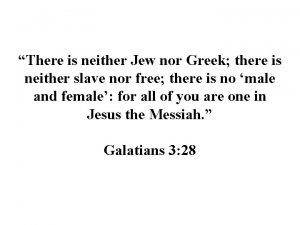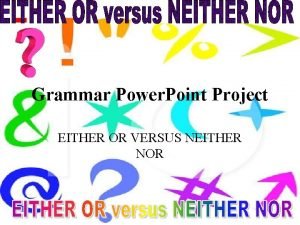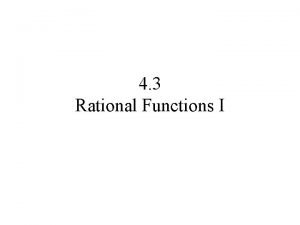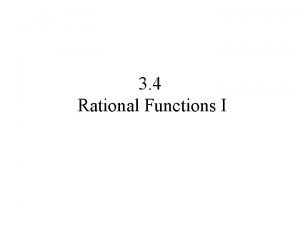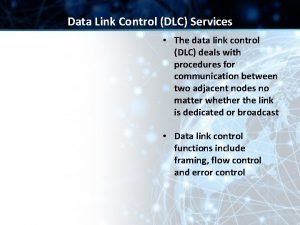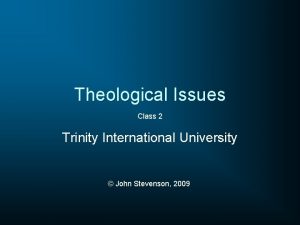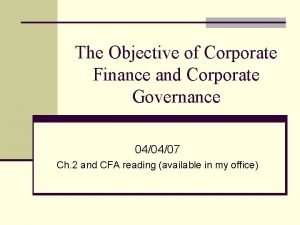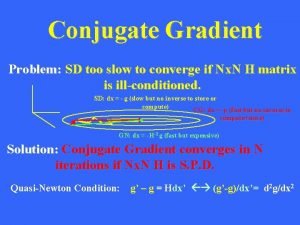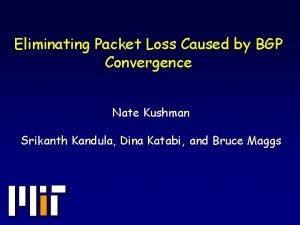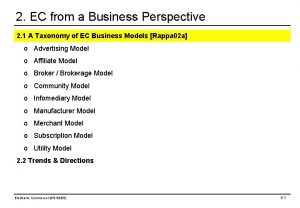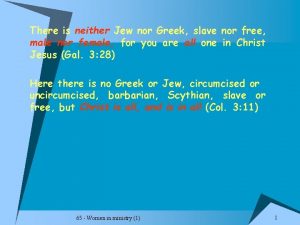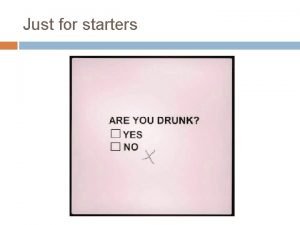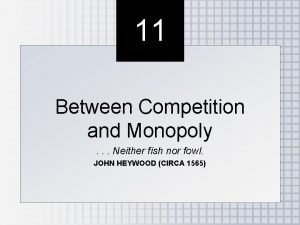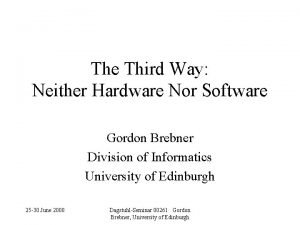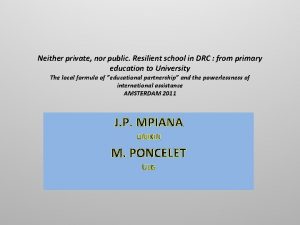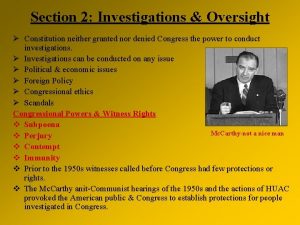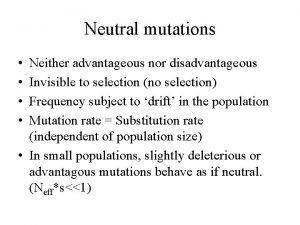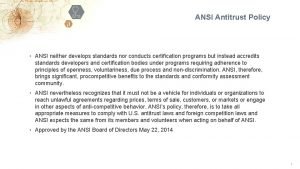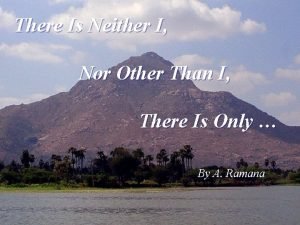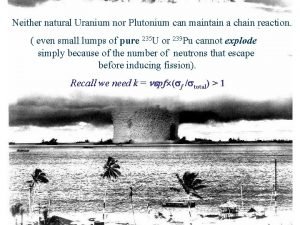Where Neither Corporate Nor International Law Converge The




























- Slides: 28

Where Neither Corporate Nor International Law Converge: The Multinational Enterprise and Societal Frameworks Larry Catá Backer (白 轲) W. Richard and Mary Eshelman Faculty Scholar Professor of Law and International Affairs; Pennsylvania State University ASIL International Legal Theory Interest Group (ILTIG) Symposium When Corporate And International Law Meet: Corporate Agency In A Global Context American Society of International Law, Tillar House; 11 May 2018

Situating the Problem After over half a century, the structural frameworks of globalization has produced governance gaps and transnational production chains Much of what is going on in the regulation of CSR and its related aspects (duties, responsibilities and rights) is not happening within the conventional structures of the corporation (enterprise) or law. The regulatory focus instead is on two constructs, neither of which is recognized fully in law: (1) Multinational corporations (MBCs); and (2) Societal rule making But the regulation of both of these constructs is made more difficult by the conventional centrality of the corporation and of state based law (domestic and international) with all of its baggage

The Conundrum The corporation Domestic Law Juridical person; recognized through application of domestic legal orders Grounded in statute and administrative regulation Equivalents (partnerships, LLCs, etc. New: social credit and big data management Data driven governance through assessment and accountability mechanisms And the rest: norms, declarations, frameworks, exhortations, . principles, etc. Forms of regulation no longer adequate to meet regulatory objectives International Law Treaties creating international bodies with regulatory authority A witches brew Organization of economic activity across borders not contained by these forms territorial limitations of state systems inadequate for regulation

Issue Consider both the MNC and societal regulatory frameworks for governance in the shadow of the corporation and conventional law and on the cusp of data driven managerial regulation Focus: the MNC as an objective of legal/social regulation Focus: the legalization of societal space, and the emerging governance characteristics of accountability and assessment Question: has the legalization of societal space come to its end in the face of data driven governance? Question: If not the MNC, are regulatory efforts targeting the right object?

What is the Societal Space Within which enterprises operate?

What Makes Rules Societal? • Statute(judicial decisions • Regulation • New methodologies (social credit) • Because enterprises chose to be bound • Because civil society, investment communities, consumers, and states seek to force enterprises to bind themselves to them Not binding law of a domestic legal order Not binding treaty law But binding all the same Not binding customary law or jus cogens • Binding states as and to the extent they seek to be bound • Or others seek to bind them (courts, political forces, other states) • Global acceptance • Quite contentious

Hard Law in CSR Field National • None; New comprehensive Business and Human Rights Treaty? • Treaty law that affects CSR (Tax, International environment, etc. ) • Corruption/Bribery; trafficking, etc. Joint-Hybrid • Investment treaties (esp. BITs) Efforts Judicial • Expand fiduciary duty of care (U. K. cases) • Expand veil piercing • National efforts, mostly disclosure oriented, ” disclose or explain” approach but extraterritoriality more popular now • Dodd Franck ¶ 1502 Conflict Minerals (2010); • UK Modern Slavery Act (2015) • France: Supply Chain Due Diligence Law (2017) [24 March 2017: Constitutional Council removed the € 10 to € 30 million civil penalty attached, liability continues to apply when companies default on their duty of vigilance obligations, including failing to publish a vigilance plan or faults in its implementation. ] • Australia Modern Slavery Bill (link here) • Traditional legislation around the factors of production and sale of goods and investment

A Leading Edge--BITs with Human Rights Elements? --Bilateral Investment Treaties typically deal with investment and investment protection --Cuban Bits tend to focus on state prerogatives --Most others -internationalize national law -might discriminate in favor of foreign investors over domestic -stabilization provisions protect investment against domestic law -focus on expropriation; --Possibilities -Incorporate HR norms in BIT subject to stabilization protection -produce strong enforcement mechanism through arbitration -Early Study HERE --Requires coherence between HR and trade bureaucracies Graphic Source (2009)

The Character of the Societal Sphere: From “Social License” to Legalization Social License • The 2 nd Pillar of the UNGP Consensus on Common Practices and Expectations of Business • The OECD Guidelines for Multinational Enterprises “Good governance” and Institutional Organization • Corporate constitutionalization and regulatory contracts among MNCs

The Societal Sphere: A Growing Area of Everything Else • Legalization of the societal sphere: Examples • UN Guiding Principles • OECD Guidelines for MNEs • 3 rd Party Standards (Extractives Specific Guideline; e. g. Extractive Industries Transparency Initiative (EITI)) • MNE internal norms • Social License for extractives • The next wave: • Social credit and big data

UNGP • Endorsed by UN Human Rights Council • Does not create new CSR or HR legal protections • Polycentric: simultaneous obligations to states and enterprises • 3 part structure • State duty to protect human rights • Extends no further than legal obligations of state • Opens the door to extraterritorial application • Corporate responsibility to respect human rights • International bill of human rights • Human rights due diligence • Obligation to work around host state restrictions • Remedial obligations for states and enterprises • Principally through state • Also international and private mechanisms • For extractives applies three different ways • State duty • • • SOEs Development Banks SWFs (contentious) State controlled banks and other lenders IFIs • Corporate responsibility • Private extractives firms • Private lenders • Public lenders operating under commercial activities exemption of sovereign immunity(? ) • Remedial • States through judicial and non judicial public mechanisms • State based and private systems with option to opt into state system (which state? ; against which entity? Under what law? )

OECD Guidelines for Multinationals • Guidelines: recommendations addressed by governments to MNEs. • They provide principles and standards of good practice consistent with applicable laws and internationally recognised standards. • Observance of the Guidelines by enterprises is voluntary and not legally enforceable. • Cover a number of general areas • transparency/disclosure, human rights, employment/industrial relations, environmental issues, bribery/corruption, consumer protection, technology transfer, anti-competitive schemes, and taxation • Special toolkit for weak governance zones • Extractives and weak governance zones HERE • OECD Due Diligence Guidance: Meaningful Stakeholder Engagement • Complaint procedures through National Contact Points. • Have been used increasingly in two contexts • NGOs to advance international normative agenda • Labor unions to leverage national litigation

3 rd Party and Private Standards GRI (Global Reporting Initiative) Social, economic and rights based reporting of economic activity Privatepublic partnerships ISO 26000 CSR EITI (Extractive Industries Transparency Initiative; (2016 Standard) Private organizations Certification of compliance with their standards Monitoring. Equator Principles

A Work in Progress; Example EITI Australia and EITI HERE (overview of Australia's Pilot of the Extractive Industries Transparency Initiative within Australia’s resources sector. ) Source: Extractive Industry Transparency Initiative EITI Web Site

Internal MNE Norms and Social License • Largest MNEs already have harmonized and sometimes complex systems of CSR based control of its supply and production chain throughout their global operations • Rio Tinto • Barrick • Trans. Canada • Internal governance norms applied throughout production chain and administered through the MNE itself enforced through contractual and capital arrangements. • Supply Chain Codes of Conduct • Codes of Ethics • Constraints to application: veil piercing rules, contract principles (e. g. , 3 rd party beneficiary, etc. ). • Recent U. K. cases • Sustainability cases in the U. S. and Europe • Indirect enforcement • Through financial intermediaries • Public-Private Partnerships (Dutch Banking Sector Accords)

The MNC

As an Object of Regulatory Interest System: Competition law Nexus of operations: Tax Entity: Tort Liability Production Chain: Disclosure; BHR

From Polycentricity on Regulation to Polycentricity on MNE regulation moves governance well beyond the well-worn and ultimately unsatisfactory traditional tools of law deployed by and within domestic legal orders. Some elements of transnational regulatory structures appear to be moving from the objectification of the MNE as an entity to the management The misalignment of state and MNE makes such approaches unsuitable to attain goals of regulating MNEs. of its form through interventions in its linkages and connections, In the MNE one encounters entity, connections and linkages, and functionally differentiated production chains. of the production process which is itself the object of MNE function. Each aspect of the MNE is partially and simultaneously by layers of regulatory governance, the effectiveness of which is limited to that portion of the “idea” of the MNE to which it attaches.

The Future: Social Credit

Chinese Social Credit will focus on four areas: "sincerity in government affairs" (政��信 ), "commercial sincerity" (商 ��信 ), "societal sincerity" (社会�信 ), and "judicial credibility" (司法公信). An example of China’s “toplevel design” (���� ) approach; coordinated by the Central Leading Small Group for Comprehensively Deepening Reforms. It is a project for the development of a national reputation system, assigning a social credit number that reflect a qualitative judgment of relevant data gathered about the subject.

Building the Integrated System: China State at the Center Focus on four sectors • Coordination, • Leadership • Government, commercial activities, social integrity, judicial credibility ¶ II(1)(4) Build, Share, Implement

Does the West Have a Social Credit System? There is no social credit system in the West analogous to emerging Chinese model • A Governance, Risk Management, and Compliance (GRC) model • Systems of data drive management controls • Systems for identifying and responding to risks affecting objectives of specific parties • System for identifying and meeting legal and social norm requirements • Applied to and by public and private actors; little coordination. What the West has developed are aggregations of related functions: • • • surveillance reporting, including disclosure for accountability (through law) data collection, markets in data repacking and distribution, Analytics and relational connections between objectives or principles and behaviors • Reward and punishment system (inducement, discipline, social behavior management

Data Based Regulatory Circles Compliance regimes Risk reduction Damage control Risk Data/data analytics

Technical and Normative Challenges to Construction of Social Credit or Ratings Systems Data Identification Data Collection Algorithm Assessment Rating Effects-Decision, Discretion, reward, discipline

What Social Credit Adds to the Regulatory Discussion Who is regulating: governmentalization of economic sector privatization of the state What is the division of authority between political and economic institutions? How does this reshape transnational regulation Regulatory Tools: policy as data analytics and algorithmic premise Recharacterization of Data: both a critical factor in production and the key element of managerial politics Does the character of MNE personality (entity, linkages, network, etc. ) shape rulemaking? Accountability as the new constitutionalism grounded in -data and data analytics to regulate both the state and the MNC as autonomous elements of global managerial operating system From Command Control to algorithm and Management

Conclusion: Discussion Points Going Forward The multinational corporation • Entity • System • Production chain Regulatory Space in the Societal Sphere • What is social space? • Differentiations from law? • A matter of intermeshing at the margins of formal systems? • What of data driven governance? The Witches Brew • Where MNCs and societal rules meet corporate forms and conventional legal forms and institutions in transnational space • Forms of regulation no longer adequate to meet regulatory objectives • Need to think about new ways to understand MNCs, law, societal governance and their relationships

Challenges Has the legalization of societal “regulatory” space come to its end in the face of data driven governance? Has the object of regulation, the MNC, now ceased to exist as a coherent single vessel into which regulatory responsivity can be poured? Are regulatory initiatives using the rights tools? Are they targeting the right place or object?

Thanks!
 Neither snow nor rain nor heat
Neither snow nor rain nor heat Which no is neither prime nor composite
Which no is neither prime nor composite William shakespeare education
William shakespeare education There is no jew nor greek slave or free
There is no jew nor greek slave or free Neither nor example
Neither nor example Or vs nor
Or vs nor Nor b
Nor b Vertical asymptote
Vertical asymptote Inversion with neither nor
Inversion with neither nor Asymptote that is neither horizontal nor vertical
Asymptote that is neither horizontal nor vertical Asymptote that is neither horizontal nor vertical
Asymptote that is neither horizontal nor vertical Not better nor worse
Not better nor worse Dlc protocol
Dlc protocol Nor death nor principalities
Nor death nor principalities Nor death nor principalities
Nor death nor principalities Nor death nor principalities
Nor death nor principalities Objectives of corporate finance
Objectives of corporate finance Définition de l'hyperconvergence
Définition de l'hyperconvergence Sum of infinite geometric series
Sum of infinite geometric series Two cold air masses converge on a warm air mass
Two cold air masses converge on a warm air mass Under what conditions does an alternating series converge?
Under what conditions does an alternating series converge? Itil service lifecycle
Itil service lifecycle Converge slow
Converge slow Clicktotalk converge
Clicktotalk converge Converge packet loss
Converge packet loss Uhealth converge
Uhealth converge Infomediary model
Infomediary model Newton's first law and second law and third law
Newton's first law and second law and third law Newton's first law and second law and third law
Newton's first law and second law and third law



